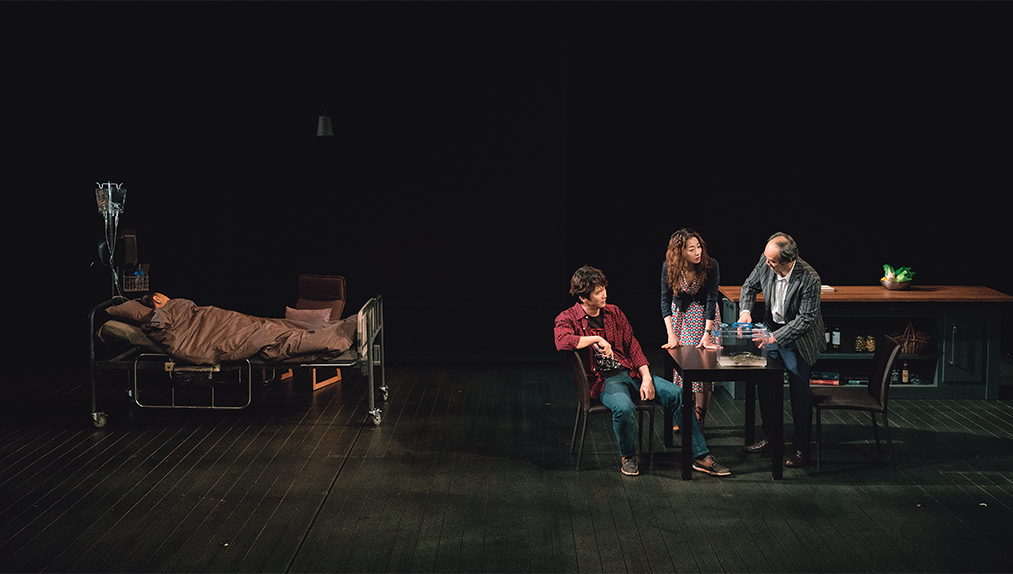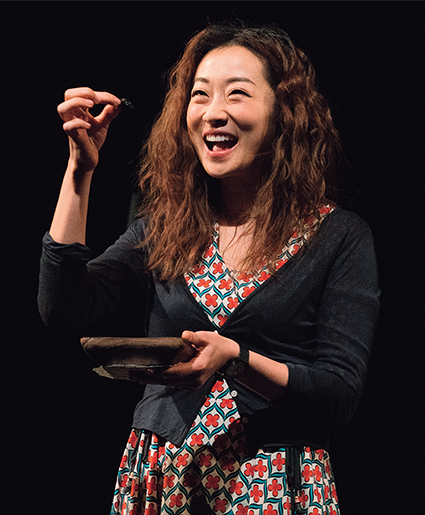The L.A.-born Korean-American playwright Julia Cho has been active since the turn of the millennium, writing both for theater and TV. “Aubergine,” for which she won the prestigious Will Glickman Award, was presented last year by the National Theater Company of Korea under the direction of Jung Seung-hyon. The play has returned to the stage this year, touching the hearts of many and drawing attention to Cho’s works.

A Korean version of “Aubergine,” written by Korean-American playwright Julia Cho, is presented by the National Theater Company of Korea. In the drama dealing with the subject of life and death through food, the protagonist’s uncle shows the ingredients he has brought from Korea to prepare turtle soup for his dying brother, with whom he parted 30 years ago.
A play about food, “Aubergine” is both wholesome and savory. Food serves as a medium for delivering the key message throughout. The clever interplay of English and Korean in the dialogue, as well as the composed manner with which the playwright deals with the problems of life and death, adds to the merits of the play.
In “Aubergine,” Julia Cho suggests that joy and unhappiness may just be a matter of how you see things, and that life and death are merely a part of the flow of things and the end we all dread could simply be like having a meal together. She invites the audience to consider that maybe all it takes is a tiny bit of courage to make that shift in perspective.
A Meal of Reconciliation
The story of “Aubergine,” which premiered in 2016 at the Berkeley Repertory Theater in Berkeley, California, revolves around a Korean immigrant family in the United States. The son, Ray, has had a challenging childhood. His mother died in a car accident when he was a little boy, and he grew up under the care of his father who rarely showed his feelings. Having grown up hungering for motherly love, Ray discovers a passion for cooking and becomes a chef. His austere and distant father, however, never displays any signs of appreciation for his creations. Their relationship only sours over the years, and before they can patch things up, Ray’s father falls seriously ill. Ray is stricken with a confusion of emotions as he watches his father slip away, barely kept alive by an oxygen mask.
Supporting Ray through the tough days are his girlfriend, Cornelia, and the hospice nurse, Lucien. Cornelia, who can speak Korean, helps Ray establish contact with his uncle in Korea, while Lucien helps Ray deal with the complex feelings he suffers at the impending death of his father.
Having received the sad news from Cornelia, Ray’s uncle comes to visit his brother after a 30-year separation. He remembers how his brother cried at the last meal their mother had prepared for them and so decides to make turtle soup for him. It may be his brother’s last meal. Eager to carry out his plan, Ray’s uncle even brings the ingredients, including a turtle, but he clashes with Ray who does not want to cook the dish.
The characters in the play have different linguistic backgrounds. Ray and Lucien can only speak English while Ray’s uncle only speaks Korean. Cornelia is the bilingual who makes communication possible. Julia Cho, who does not speak Korean, interspersed the script, written mostly in English, with Korean words. The translator, Park Chun-keun, noticed this. Had he not fathomed the playwright’s intention, the context would have been lost and the drama downright clichéd. However, the translator understood, and the director and cast smartly delivered.
The conversations between Ray and his uncle cannot be called proper communication. Sometimes the situation gets quite funny due to their inability to verbally connect, but the two men seem quite nonchalant about such misunderstandings. Cornelia proves herself to be a helpful interpreter, seeing their dialogue from her own angle and rendering their words in the other language in a witty way, which invites applause from the audience.
Mix-ups due to the language barrier are far more than just humorous devices. They propose a new take on the meaning of “understanding.” The characters are not quick to jump to conclusions about what the other is saying or thinking. They take their time, willing to stand aside and observe to come to a better understanding. The respect with which they treat each other is palpable to the audience, who share the heart-warming experience and the good feeling that comes from being respected.
Julia Cho treats life and death, past and present, misunderstanding and understanding as reflections of each other. She invites the audience to shift their vantage point so that they, too, may see opposing concepts as being tied together on a single thread.
Implications of Language Difference
The choice of the French word “aubergine” over “eggplant” for the title was very much intended. There are words in the English lexicon that originated from foreign cultures and Cho said she wanted to convey, for example, how “eggplant” and “aubergine” sound different while they refer to the same thing.
There is indeed a notable difference between the two words. When Lucien gives Ray an eggplant he’d grown in his neighborhood, he tells Ray: “Yes, it’s an eggplant, but aubergine is so much more beautiful.”

Ray, the protagonist, regrets the misunderstanding and hatred he felt toward his father as he awaits his death. The relationship between Ray, who speaks only English, and his father, who is not good at the language, has soured over the years.
Language is a set of rules in which objects are signified by words. Words that are from different languages but refer to the same thing are essentially the same, although they are subject to different conventions. Yet, we often see examples of language being used as a yardstick for the relative value of things and people. It is not likely that Cho, who has never lived in Korea, understood precisely how English is valued versus Korean. She respected the differences in the two languages and endeavored to faithfully deal with them in her work, probably without realizing that in Korea there may be an added element of discrimination that plays into these differences. The local translator, director and cast addressed this quite compellingly in the Korean context, where the English language is often preferred or valued over the native tongue. This was then picked up by the local audience. Those who followed the story without thinking too much about these aspects may have asked themselves at the end of the play, “So what does the title mean?” Meanwhile, those who had had the title on their minds from the beginning may have felt that its implications were not fully explored.
When she was approached to write a play about food, Julia Cho had been on a writing hiatus. The new assignment, though, seemed quite simple, and so she took it on. Soon enough, she found herself writing not only about food but about “family, memory and culture, the deeper subjects.”
The characters in the play each deliver a monologue on their memories of food and the things they miss. Cornelia, who hated food because of her mother’s excessive passion for cooking, regains her memory of her father after tasting the mulberries Ray gives her. Ray, on the other hand, finally becomes the true chef he can take pride in being only after he comes to fully understand his father, who had seemed so cold and unappreciative all his life. Diane, a foodie, who travels all over the world with her husband to dine in all kinds of restaurants, but all the while missing the taste of her father’s pastrami sandwiches, appears in the prologue and then the epilogue, or in food terms, like an appetizer and a dessert.
Just as the play’s beginning and end are designed to mirror each other with Diane serving as the link, Julia Cho treats life and death, past and present, misunderstanding and understanding as reflections of each other. She invites the audience to shift their vantage point so that they, too, may see opposing concepts as being tied together on a single thread. In this sense, loss and abundance are inextricably connected.
“We hold the hands of the dying. But we are not the ones holding their hands. They are the ones holding ours.”
These are the words of Lucien, the hospice nurse, whose voice the playwright also uses to say, “No matter how anxious you are, your loved one will choose when to go.” Thus Lucien advises, “There is no need to stay by your loved one’s side every minute of the day and night. Take a shower. Go get some air. Get something to eat.” Through Lucien, Julia Cho seems to be saying that at such times, our best available option is to fully live in the present moment - a message that arouses both hunger and a sense of satisfaction.

Cornelia, Ray’s girlfriend, is reminded of her father after tasting the mulberries Ray gives her. All the characters in the play have their own special food that takes them on a trip through their own memories.
Faith in the Audience
“Aubergine” has enjoyed more than a warm reception in Korea. At the 54th Dong-A Theater Awards this year, it won the best production award, while Kim Jung-ho, who played Ray’s uncle, won the award for the best actor. After its Korean premiere last year, critics and theater-goers alike praised the play as having “a quiet but deep resonance.” In March this year, “Aubergine” was presented again by the National Theater Company of Korea, and at about the same time, it was also presented in the United States at the Olney Theatre Center in Maryland and the Everyman Theatre in Baltimore.
In terms of its structure and writing, “Aubergine” may not stand out. Yet it continues to be presented in different theaters, drawing favorable responses. One of its main appeals may be that while dealing with the somber subjects of death and loss, the play does not go into long platitudes or emphasize takeaways for the audience. For the writer to shed rather than add explanations, it takes sufficient faith in and respect for the audience.
There are things that we do not quite notice until we shift our vantage point a bit. Our perspective widens when we are liberated from illusions that trap our thinking. It is in those scenes where the playwright does not attempt to explain all that the audience discovers the unsaid. Julia Cho deftly demonstrates what it means to believe in the audience.